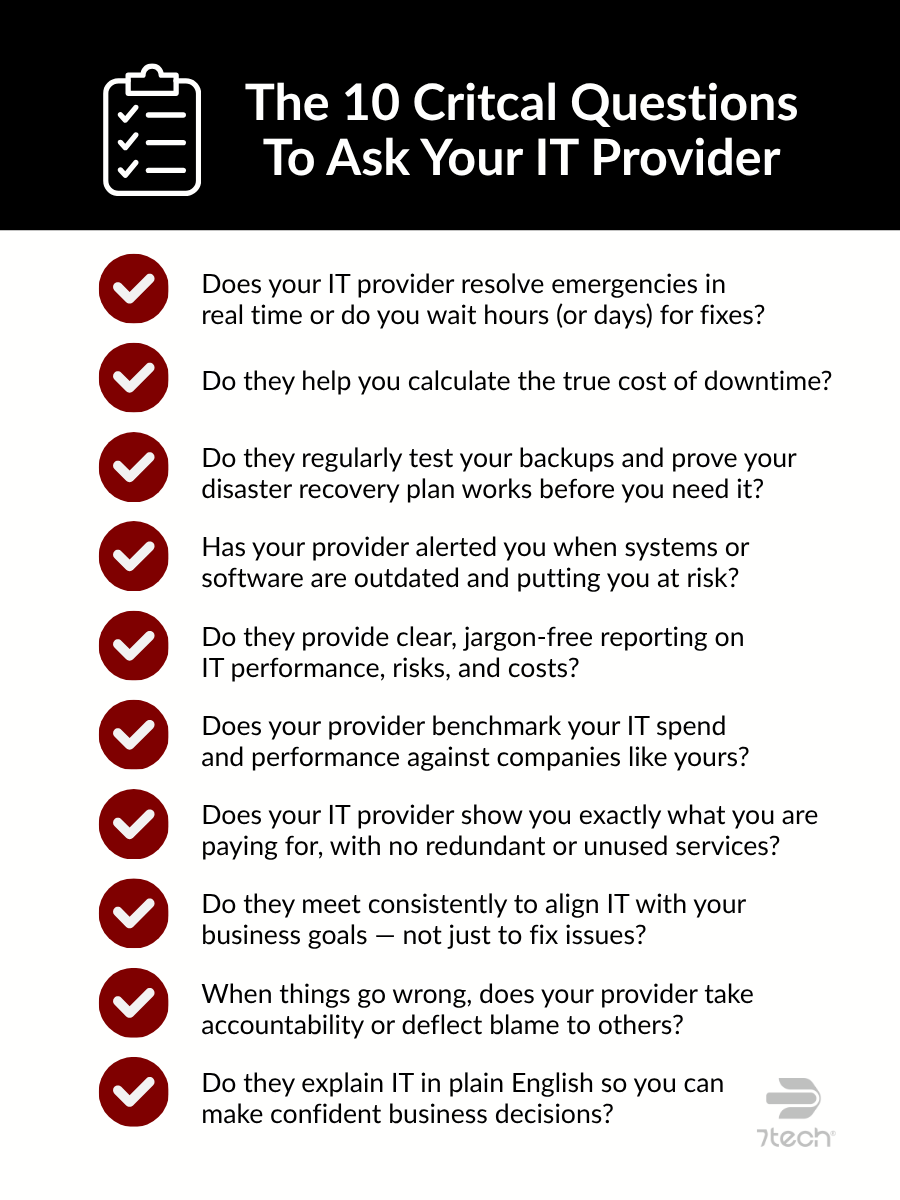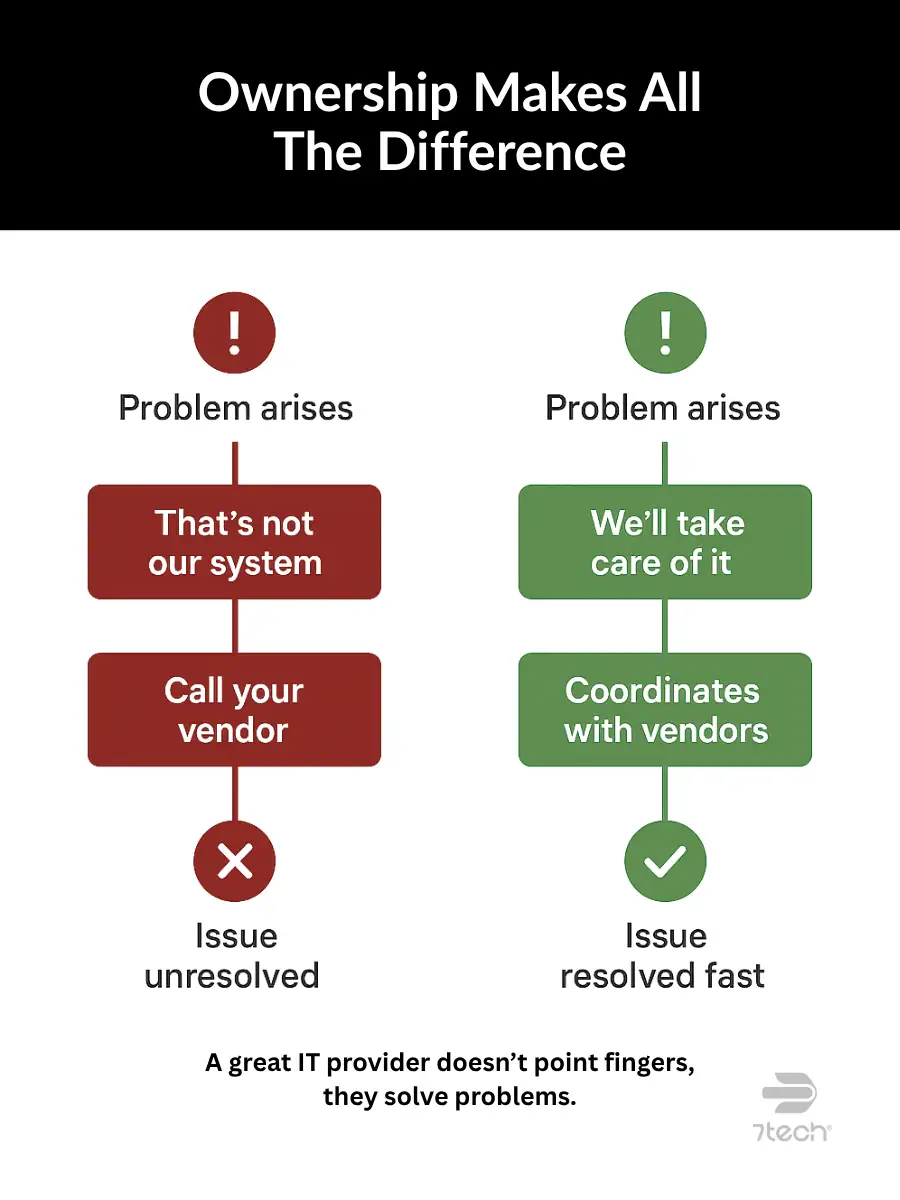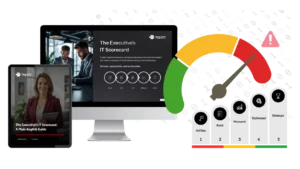
Questions To Ask Your IT Provider (That Most Never Do)
Top 10 Questions to Ask Your IT Provider Today:
- How quickly can you respond and resolve emergency IT issues?
- Can you help us calculate the real cost of IT downtime for our business?
- How often do you test our backups and validate our disaster recovery plan?
- Will you alert us when outdated systems or software put us at risk?
- Can you show us clear reports on IT performance, risks, and costs?
- Do you benchmark our IT performance and spending against similar businesses?
- Can you explain exactly what we’re paying for and eliminate waste?
- How often will we meet to align IT strategy with our business goals?
- How do you take ownership when things go wrong?
- Can you explain technical issues in plain English so we can make smart decisions?
If you’re a business leader, these 10 questions are your best tool for evaluating whether your IT provider is helping you move forward… or holding you back. The answers can reveal whether you’re working with a proactive partner or simply paying for reactive support.
Not sure how to choose a managed service provider in the first place? Here’s a breakdown that takes the guesswork out of it.
Let’s take a closer look at each one.
1. How quickly can you respond and resolve emergency IT issues?
Downtime is more than annoying, it’s expensive. When your systems go down your team stops working, customers get frustrated, and deadlines slip. That’s why fast, real-time support is critical.
You need an IT provider that treats every emergency like a priority. Fast response times and same-day resolutions show they understand business urgency.
If they brush you off with “we’ll escalate your ticket,” you’re stuck in their system not getting the help you need when it matters most… and that’s a red flag.
2. Can you help us calculate the real cost of IT downtime for our business?
A proactive Managed Service Provider will work with you to understand what downtime costs your specific business. They’ll factor in your staff size, processes, and client impact. That number should guide every IT decision you make.
Every minute your team can’t work is costing you:
- Revenue from missed sales
- Time your team can’t bill or produce
- Customer trust from missed deadlines
If you want to estimate it yourself, here’s a quick way to calculate the true cost of IT downtime using a simple formula.
Red flag: If your provider can’t define or measure the financial impact of downtime, they can’t help you prevent it.
3. How often do you test our backups and validate our disaster recovery plan?
It’s not enough to have backups. You need to know they actually work.
The best IT companies don’t just say, “We’ve got you covered.” They run recovery tests regularly and show you proof. They simulate real-world outages and walk you through exactly what would happen if your systems crashed today.
Red flag: If they haven’t tested your recovery process or can’t show proof, that’s a major risk.
 4. Will you alert us when outdated systems or software put us at risk?
4. Will you alert us when outdated systems or software put us at risk?
Outdated software is one of the top ways hackers get into your systems. And yet, many businesses don’t find out their tools are obsolete until after something breaks or worse, after a breach.
A report from Siemens showed unscheduled downtime drained 11% of annual revenue from the world’s top companies — and in the automotive sector lost as much as $2.3 million per hour.
A proactive IT partner doesn’t wait for you to complain. They monitor your environment continuously and alert you before risks escalate.
The right partner flags aging systems and offers upgrade plans in advance.
Red flag: If updates only happen when you complain, your provider is reactive… not strategic.
5. Can you show us clear reports on IT performance, risks, and costs?
Business leaders shouldn’t have to interpret complex dashboards or raw logs. You should understand what’s working, where the risks are, and what you’re spending.
A strong provider will give you reports that make sense, even if you’re not technical. That includes:
- clear updates on your network support
- system health
- cybersecurity risks
- support ticket trends
- and where your budget is going.
Red flag: If all you’re getting are raw logs or vague graphs, that’s not transparency. That’s confusion dressed up as expertise.
6. Do you benchmark our IT performance and spending against similar businesses?
How do you know if you’re investing enough… or too much in IT? Without a point of reference, it’s impossible to tell.
A great Managed Service Provider will use industry benchmarks to help you assess your position and guide future investments. That way, you’re not just guessing. You’re making informed decisions backed by data.
Red flag: If your provider says, “Every business is different,” they’re avoiding the question and you could be overpaying or under-protected without realizing it.
7. Can you explain exactly what we’re paying for and eliminate waste?
You deserve to know where your IT budget is going. It’s easy to end up paying for tools, licenses, or services you don’t need especially if your provider doesn’t explain your invoice clearly.
A transparent IT company will:
- audit your services regularly
- eliminate waste
- and help you trim unnecessary costs.
They’ll walk you through each line item and explain what it does for your business.
Red flag: If your invoice is vague or filled with bundled charges, it’s time to ask for a breakdown.
8. How often will we meet to align IT strategy with our business goals?
IT support should go beyond break-fix. Your business deserves a partner who helps you plan ahead.
That’s where strategic alignment comes in. Your IT provider should meet with you regularly (quarterly at minimum) to understand where your business is going and make sure your technology supports that vision.
These meetings are where strategy happens. Not just updates, but real alignment.
Red flag: If you only hear from your provider when something breaks, they’re not acting as a true partner.
9. How do you take ownership when things go wrong?
Every IT provider promises great service… but what matters is what happens when things don’t go smoothly.
Ask your provider how they handle issues that impact your business, especially when mistakes or vendor dependencies are involved.
A reliable MSP doesn’t pass the buck. They:
- own the issue
- coordinate with other vendors
- and make sure it gets fixed
That kind of accountability separates a true partner from a vendor just trying to protect themselves.
Red flag: If they say things like, “That’s not our fault” or “You’ll need to contact the vendor,” they’re not owning the outcome — they’re passing the problem back to you.
10. Can you explain technical issues in plain English so we can make smart decisions?
IT shouldn’t feel like a foreign language. You should be able to ask questions, get straight answers, and understand the trade-offs.
The best IT companies break things down clearly not to dumb it down, but to empower you. They know that clear communication builds:
- trust
- confidence
- and faster decision-making
Red flag: If you constantly feel like you’re being talked over or brushed off, that’s not okay. You deserve answers you can actually use.
What Your IT Provider’s Answers Actually Reveal About Risk
What Your IT Provider’s Answers Actually Reveal About Risk
Once you’ve asked these questions, listen closely not just to the answers but how they’re delivered.
Your provider’s behavior tells you more than a sales deck ever will.
Here’s how to spot warning signs:
| If They… | It Means… | Your Risk |
|---|---|---|
| Dodge questions or give vague replies | No clear process | Your team is exposed to preventable problems |
| Blame vendors, tools, or others | Lack of accountability | You waste time playing middleman |
| Use jargon or avoid specifics | Poor communication or hidden issues | You can’t make informed business decisions |
If you’re starting to notice these patterns, it might be time to switch your managed IT provider — here are 7 signs that make the decision easier.
How These Questions to Ask Your IT Provider Helped This Business
A real estate firm in Texas had been dealing with the same managed IT provider for years. On paper, everything looked fine but behind the scenes, things weren’t adding up.
Support was slow. Their systems felt outdated. And no one could explain clearly what was being billed each month.
They weren’t sure how to bring up their concerns, let alone how to switch without causing disruption.
When they partnered with 7tech, that uncertainty changed quickly. Here’s what one of their leaders shared after the transition:
“Since partnering with 7tech, we’ve experienced a major improvement in how our systems run day to day. We recently moved away from an outdated setup from our previous IT provider, and the transition to 7tech’s more efficient system has made a clear difference.”
— Clint Bendele, Valbridge Property Advisors
It’s proof that asking the right questions to your IT provider isn’t just a smart move, it’s the first step to getting the support you actually deserve.
Why Choose 7tech as Your IT Provider?
At 7tech, we’ve been delivering professional outsourced IT services, support, and cybersecurity to small and midsize Texas businesses since 2012. What sets us apart isn’t just our service, it’s how we show up.
Here’s why companies trust 7tech:
-
20-minute human response: fast help from real people, not bots.
-
Same-day ticket resolution: most issues fixed within hours.
-
24/7 US-based support: always on, never outsourced.
-
Plain-English answers: no tech-speak, just clarity.
-
Security-first mindset: protection built into every service.
-
Award-winning MSP: top-ranked in the US and worldwide.
-
Business-aligned IT: we support your goals, not just your gear.
Our focus is simple: keep your team productive, your systems secure, and your IT easy to manage.
Thinking of Switching Providers?
If your current IT support can’t confidently answer the key questions to ask your IT provider, it may be time to explore a new partner — one that delivers truly proactive, business-aligned managed IT services.
The good news? Switching Managed IT providers doesn’t have to be disruptive, dramatic, or risky.
In fact many of the businesses we work with started just like you, quietly evaluating options, unsure how to make a change without chaos. We helped them transition smoothly, without downtime or data loss.
Before you make a move, here are the mistakes to avoid when choosing an IT provider — so you don’t repeat what went wrong the first time.
In our next guide, we’ll show you how to switch your IT provider with minimal disruption
FAQs: Questions to Ask Your IT Provider
Q1: What should I ask an IT provider before hiring them?
A: Start with: How fast do you respond to emergencies? Do you test backups? Can you show reporting in plain English?
Q2: What are the signs of a bad IT provider?
A: Slow response times, vague reporting, blaming others, no strategic alignment, or excessive downtime.
Q3: How often should my IT provider meet with us?
A: At minimum, quarterly. A great Managed Service Provider (MSP) will meet regularly to plan, not just fix.
Q4: Is switching providers the same as IT outsourcing?
A: Not exactly. IT outsourcing means fully handing off your IT operations to a third-party provider. But many businesses opt for co-managed IT services, where your internal team works alongside an MSP for added support and expertise.
Q5: How can I switch IT providers without disrupting my business?
A: With the right partner, it can be smooth. Ask for a step-by-step onboarding plan, data transition strategy, and clear timelines.
Did these questions to ask your IT provider raise concerns?
At 7tech, we believe every business deserves a partner not just a provider.
If these questions revealed gaps, blind spots, or concerns in your current IT relationship, let’s talk.
Schedule a free 15-minute discovery call – no pressure, totally risk free.
Just a conversation to help you understand where you stand and what better could look like.

Neal Juern, CEO of 7tech, helps business leaders take control of their IT and strengthen cybersecurity without the complexity. Known for his straight-talk, business-first approach, Neal has guided hundreds of executives toward smarter, safer operations through Managed IT Services and Managed Security Services that make sense to people outside the IT department.



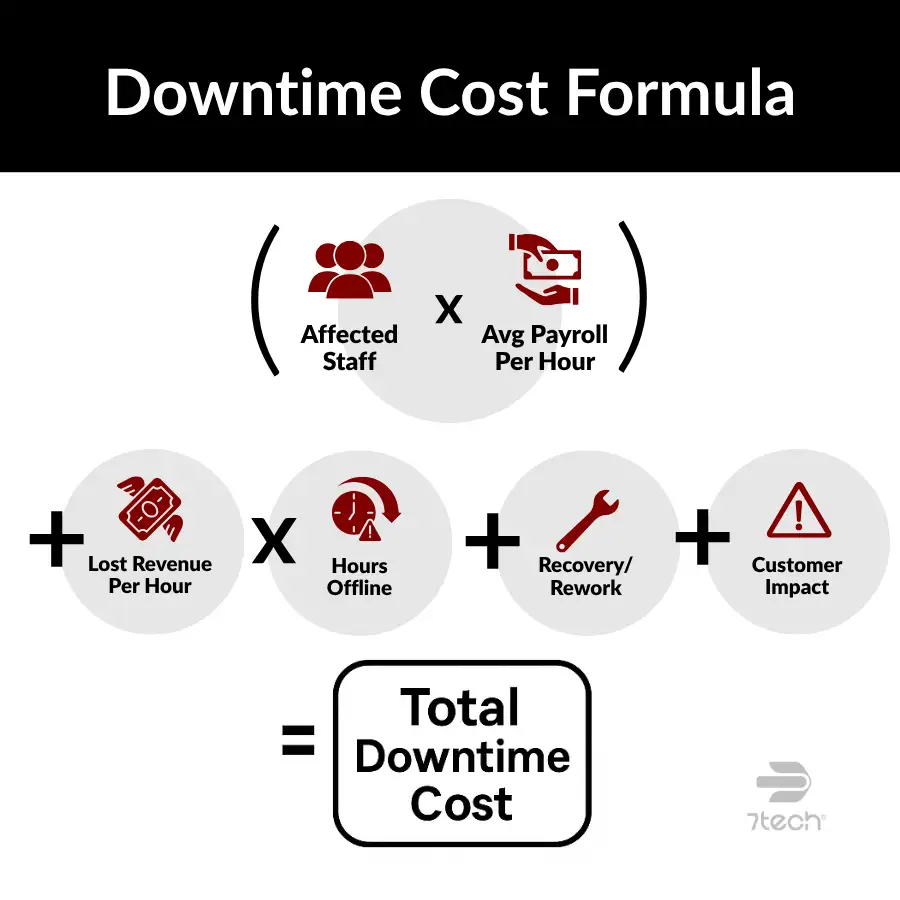
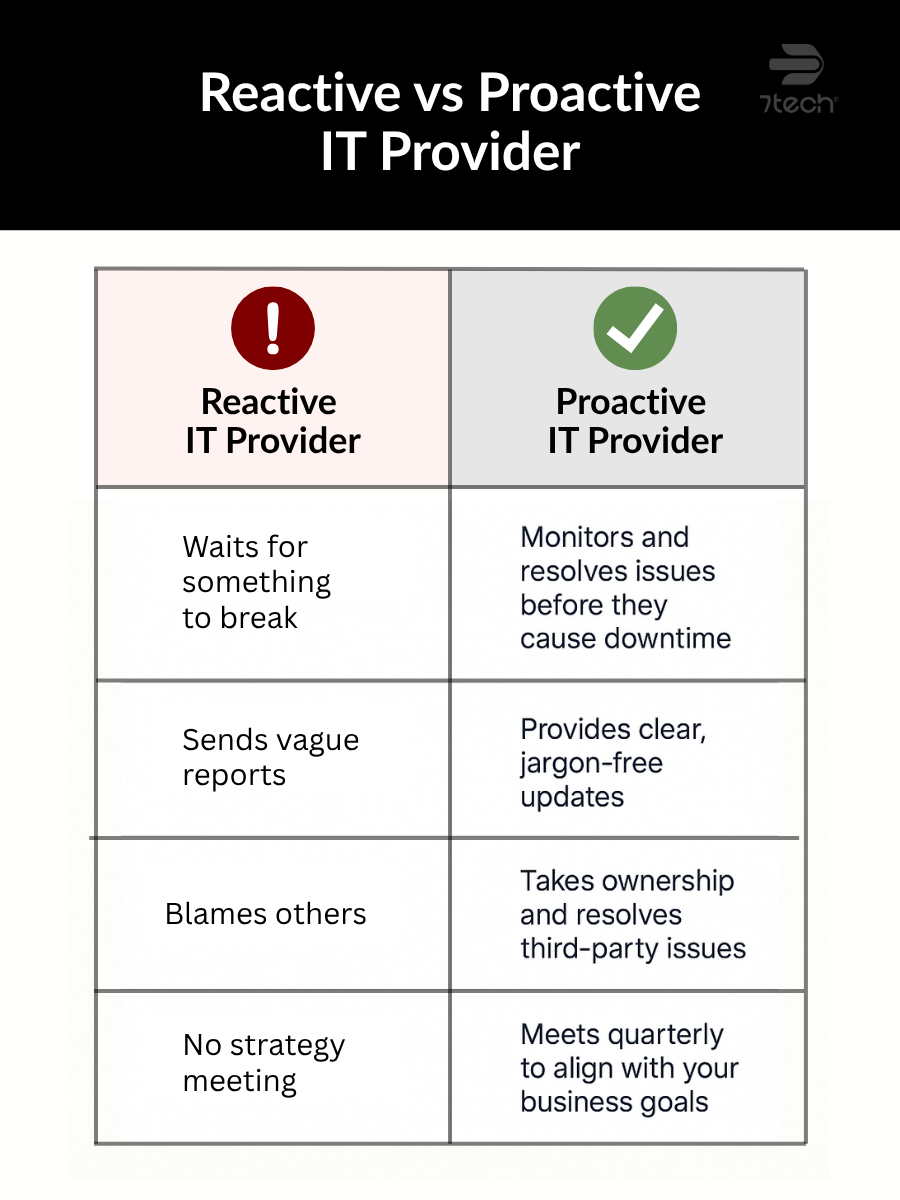 4. Will you alert us when outdated systems or software put us at risk?
4. Will you alert us when outdated systems or software put us at risk?